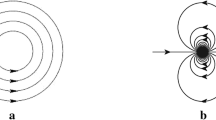Abstract
A new approach is considered which explores a decentralised trajectory optimisation algorithm in partly collaborative multi-agent systems to improve safety and provide reliable collision avoidance for vessels in narrow waterways and the open sea. This research will explore trajectory planning under the hypothesis that not all vessels in an encounter will be able or willing to use the same, proposed system. Planning realistic trajectories, which minimise the need to re-plan, will be achieved by observing the predicted behaviour of uncooperative vessels, based on probabilistic models derived from historic data.
Access this chapter
Tax calculation will be finalised at checkout
Purchases are for personal use only
Preview
Unable to display preview. Download preview PDF.
Similar content being viewed by others
References
Hetherington, C., Flin, R., Mearns, K.: Safety in shipping: the human element. Journal of Safety Research 37(4), 401–411 (2006)
Perera, L.P., Carvalho, J.P., Guedes Soares, C.: Fuzzy logic based decision making system for collision avoidance of ocean navigation under critical collision conditions. Journal of Marine Science and Technology 16(1), 84–99 (2010)
Shih, C.H., Huang, P.: Design optimal control of ship maneuver patterns for collision avoidance: a review. Journal of Marine … 20(2), 111–121 (2012)
Hearn, G.E.: A ship based intelligent anti-collision decision-making support system utilizing trial manoeuvres. In: 2008 Chinese Control and Decision Conference, pp. 3982–3987 (July 2008)
Tsou, M.: The study of ship collision avoidance route planning by ant colony algorithm. Journal of Marine Science and Technology 18(5), 746–756 (2010)
Kalus, A., Ashford, A., Cook, C.: Cognitive Modelling for Decision Support in Naval Command & Control. Proceedings of MAICS…, 25–32 (1999)
Brüggemann, U., Strohschneider, S., Meck, U.: Virtuelle Nautiker als Probefahrer bei der Neukonzeption von Schiffsbrücken. Künstliche Intelligenz (2008)
Eilers, M., Möbus, C.: Learning the Relevant Percepts of Modular Hierarchical Bayesian Driver Models using a Bayesian Information Criterion 2 Bayesian Autonomous Driver Mixture-of-Behaviors Models, pp. 1–10 (2011)
Ristic, B., Scala, B.L., Morelande, M.: Statistical analysis of motion patterns in AIS data: Anomaly detection and motion prediction. In: 2008 11th Fusion, pp. 40–46 (2008)
Gunnar Aarsæther, K., Moan, T.: Estimating Navigation Patterns from AIS. Journal of Navigation 62(4), 587 (2009)
Porathe, T.: Transmitting intended and suggested routes in ship operations: cognitive off-loading by placing knowledge in the world. Work: A Journal of Prevention, Assessment and … 41, 4873–4878 (2012)
Roman, Smierzchalski, Z.M.: Path planning in dynamic environments. Innovations in Robot Mobility and Control, 135–153 (2005)
Szlapczynski, R., Szlapczynska, J.: On evolutionary computing in multi-ship trajectory planning. Applied Intelligence (September 2011)
Author information
Authors and Affiliations
Editor information
Editors and Affiliations
Rights and permissions
Copyright information
© 2013 Springer-Verlag Berlin Heidelberg
About this paper
Cite this paper
Hornauer, S. (2013). Decentralised Collision Avoidance in a Semi-collaborative Multi-agent System. In: Klusch, M., Thimm, M., Paprzycki, M. (eds) Multiagent System Technologies. MATES 2013. Lecture Notes in Computer Science(), vol 8076. Springer, Berlin, Heidelberg. https://doi.org/10.1007/978-3-642-40776-5_36
Download citation
DOI: https://doi.org/10.1007/978-3-642-40776-5_36
Publisher Name: Springer, Berlin, Heidelberg
Print ISBN: 978-3-642-40775-8
Online ISBN: 978-3-642-40776-5
eBook Packages: Computer ScienceComputer Science (R0)




